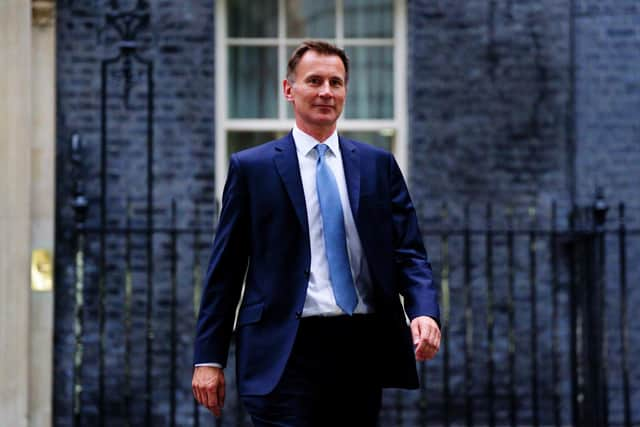Government has thrown half of genuinely self-employed contractors under the bus, says boss of tax compliance firm
The Chancellor Jeremy Hunt warned that “eye-wateringly difficult” decisions were needed as he ditched almost all the tax cuts announced by his predecessor Kwasi Kwarteng less than a month ago in a bid to restore economic stability.
Among these measures, Mr Hunt said he would no longer be taking forward a repeal of the 2017 and 2021 reforms to the off-payroll working rules – also known as IR35 – from April 2023.
Advertisement
Hide AdAdvertisement
Hide AdA Treasury statement said: “The reforms will now remain in place. This will cut the cost of the Government’s Growth Plan by around £2bn a year.”
Dave Chaplin, the chief executive of tax compliance firm IR35 Shield said: “The Government’s initial commitment to repealing the off-payroll rules was a sensible initiative and would have been a significant step forward for the UK's army of self-employed people who are critical to the Government’s pro-growth agenda.
“Repealing off-payroll would have returned an essential level of certainty to contract transactions in the market economy, leading to economic growth.
"Instead, off-payroll will continue to cause significant harm to the self-employed, major businesses, the government, and the economy.
Advertisement
Hide AdAdvertisement
Hide Ad“Whilst we agree that tax avoidance measures are sensible, the off-payroll rules are over-extended, causing genuinely self-employed contractors to lose their rights to being their own boss.


“The Conservatives U-turn on the repeal has thrown around half of the genuinely self-employed contractors under the bus, and likely kissed goodbye to their success at the next General Election.”
However, Emma Rawson, tax policy adviser with the Association of Taxation Technicians, said the ATT welcomed Mr Hunt’s announcement “in so far as we were concerned that the original plan, absent any extra resources for HMRC or new ideas on enforcing IR35, could have resulted in widespread non-compliance”.
She added: “It seemed odd to reverse changes that were originally brought in as HMRC found the original IR35 rules hard to enforce, with no explanation as to what might change to address that.”
Advertisement
Hide AdAdvertisement
Hide Ad“There is the bigger point here that the UK's rules on employment vs self-employment are very opaque and complex. That combined with the differing tax treatment drives the very behaviour which led to IR35 having to be introduced in the first place.”
In his statement, the Chancellor said: “There will be more difficult decisions to take on both tax and spending as we deliver our commitment to get debt falling as a share of the economy over the medium term.
“All departments will need to redouble their efforts to find savings, and some areas of spending will need to be cut.
“But, as I promised at the weekend our priority in making the difficult decisions that lie ahead will always be the most vulnerable.
Advertisement
Hide AdAdvertisement
Hide Ad“And I remain extremely confident about the UK’s long term economic prospects as we deliver our mission to go for growth. But growth requires confidence and stability, and the United Kingdom will always pay its way. This Government will therefore make whatever tough decisions are necessary to do so.”